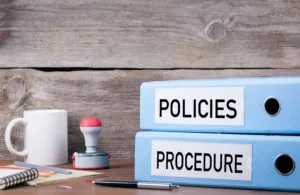Creating a drug testing policy for your organization may seem like a daunting task. The best and most efficient way to create one is to look at your organization from the inside out and determine what protocols will benefit you the most. Below are five basic clause summaries that will help lay the foundation for an effective drug testing policy for any organization.
Pre-Employment Screening Clause
Having a pre-employment drug screen is arguably the most important part of any basic drug testing policy. Screening potential candidates serves as a gatekeeping mechanism to the type of individuals that will be at your workplace each day. Employees are much less likely to develop undesirable drug habits after being hired as opposed to bringing onboard an individual with a pre-existing habit. When it comes to effectively conducting the pre-employment screening, there are a few options. The quickest and most cost-effective way to pre-screen a potential hire is to conduct an on-site test. This allows you to dictate the timeline in which you receive results so you are able to make your decision as quickly as possible. In addition, with the individual taking a drug screen on the spot, you are eliminating the possibility of a cheated test and keeping your applicants honest. There are multiple options available to complete this procedure, one of the most popular ways to do so is to administer a saliva drug test. Saliva tests include the added benefit of being able to request a test in the same room, no need to go to the bathroom. Results are 99% accurate and available in 5 minutes or less.
Random Screening Clause
Just as important as the pre-employment screening requirement is a random screening clause. Many times, individuals searching for jobs will “cleanse” their systems while looking for work in efforts to pass any type of pre-employment screening. Random screens will hold your employees accountable and give you the peace of mind that they are keeping their healthy habits in check. Random screening can be done at anytime, and just like the pre-employment screens, can be done on the spot without notice. There are even software programs available to randomly select employees to test which helps secure this clause as unbiased and non-objectionable. Keeping drug testing supplies for random checks on hand is cheap, effective, and can save your organization complications down the road.
Reasonable Suspicion Clause
Going hand in hand with random screens, reasonable suspicion guidelines will help you hold your employees accountable. While random screens are exactly what they sound like (random), reasonable suspicions can be targeted towards employees who are exhibiting behaviors that may indicate inebriation. It is important to outline what exactly indicates reasonable suspicion to avoid any miscommunication or complaints regarding a request to perform a test under these circumstances. The same supplies can be used to conduct these screens quick and effectively.
Collection and Testing Procedures
Your policy should also include specific testing procedures and instructions. Will you send everyone to a lab? Will you conduct the tests yourself? If so, who will purchase the supplies? Do you need any type of training? Having clear and defined testing procedures will make the process seamless and headache-free.
Policy Enforcement and Consequences
Upon completion of your drug testing policy, it is imperative to implement a hierarchical structure and delegate responsibility as to who will be enforcing the policy. As such, having clear and concise consequences for violation of the drug testing policy is equally as important to define from the beginning. No exceptions should be made to a drug testing policy. Ensure that the individual or department in charge will adhere to the guidelines under any and all circumstances of violation.

